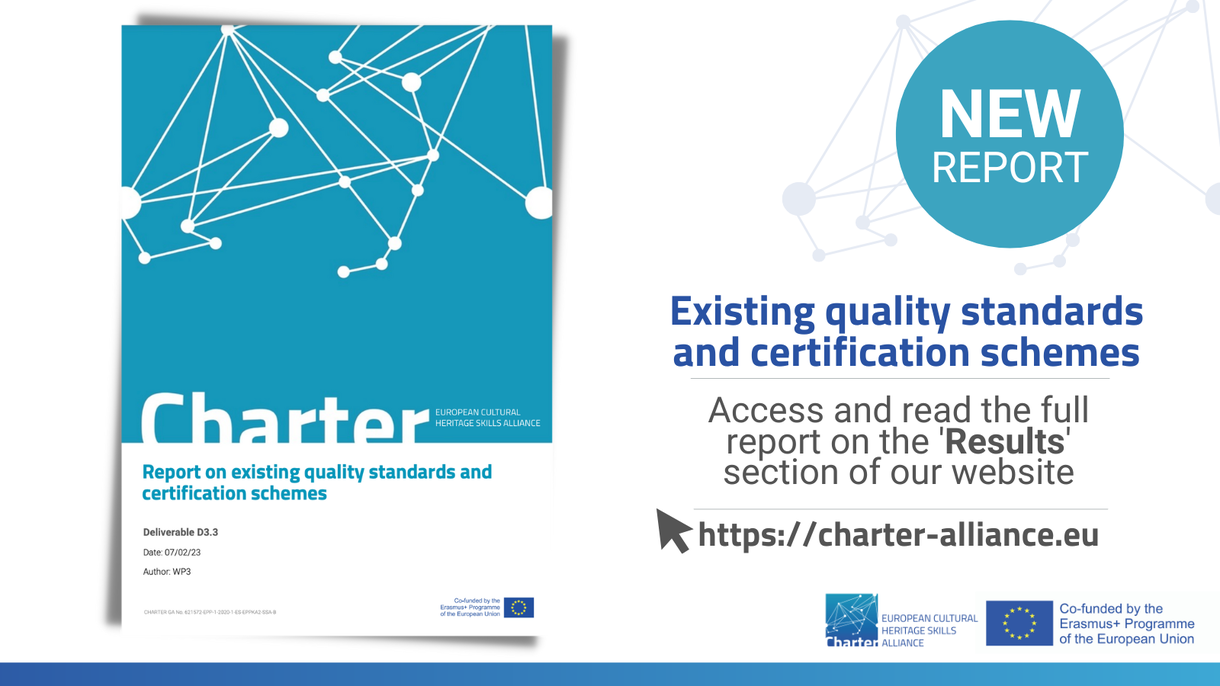“Report on existing quality standards and certification schemes” explains the main-features and developments of existing European quality standards for formal Higher education (HE) and Vocational education and training (VET) as well as the complexities of continuing education and training (CET). A separate section is dedicated to the subject of validation/certification and how they can be utilized for recognising non-formal and informal learnings. The 10 case studies demonstrate validation/certification practices across Europe and in different educational and training contexts.
The main findings of the report and their relevance for cultural heritage E&T are summarised in a concluding chapter:
- European quality standards for formal VET and HE have indeed been successfully established and implemented across Europe. However, the degree of implementation of European Credit System for Vocational Education and Training (EQAVET) and the Standards and Guidelines for Quality Assurance in the European Higher Education Area (ESG) varies between countries. Therefore, it is recommended that the implementation of European quality standards is fostered across Europe, with a particular focus on VET.
- There is a lack of, and need for, European quality standards for CET.
- The value of non-formal and informal learning must be recognised next to formal E&T. To ease validation/certification efforts, CHARTER Alliance recommends that the following principles are observed:
- Define shared quality standards for informal learning paths.
- Support shared tools that make the competences acquired through informal learning paths visible.
- Ensure that these tools make recognition of competences in higher education and the labour market viable.
“Report on existing quality standards and certification schemes” is the third report on the field of education by the Erasmus+ funded Blueprint project CHARTER - the European Cultural Heritage Skills Alliance CHARTER. It is written by the CHARTER Work Package 3 (WP3) – Vocational Education and Training and beyond. In addition to researching existing quality standards, WP3 has thoroughly analysed the 2012 “Council Recommendation on the validation of non-formal and informal learning” as well as how previous Blueprint projects have tackled similar issues.
- Read Report on existing quality standards and certification schemes
- Learn more about CHARTER Alliance: charter-alliance.eu
- Subscribe to the newsletter: bit.ly/CHARTER-newsletter
About CHARTER
CHARTER, the European Cultural Heritage Skills Alliance, brings together and represents the whole range of the cultural heritage sector in Europe. The 47 project partners strive towards making apparent the value of cultural heritage and creating a resilient and responsive sector.
CHARTER works towards creating a lasting, comprehensive strategy that will guarantee Europe has the necessary cultural heritage skills to support sustainable societies and economies.
The Erasmus+ funded project maps the current and future needs of the sector to bridge the gap of skills shortages and mismatches between the educational and occupational fields.




